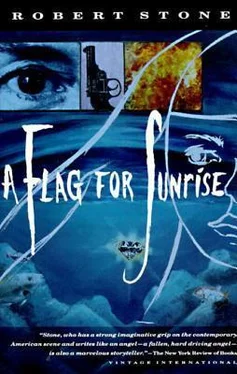Robert Stone - A Flag for Sunrise
Здесь есть возможность читать онлайн «Robert Stone - A Flag for Sunrise» весь текст электронной книги совершенно бесплатно (целиком полную версию без сокращений). В некоторых случаях можно слушать аудио, скачать через торрент в формате fb2 и присутствует краткое содержание. Год выпуска: 2012, Издательство: Vintage, Жанр: Современная проза, на английском языке. Описание произведения, (предисловие) а так же отзывы посетителей доступны на портале библиотеки ЛибКат.
- Название:A Flag for Sunrise
- Автор:
- Издательство:Vintage
- Жанр:
- Год:2012
- ISBN:нет данных
- Рейтинг книги:4 / 5. Голосов: 1
-
Избранное:Добавить в избранное
- Отзывы:
-
Ваша оценка:
- 80
- 1
- 2
- 3
- 4
- 5
A Flag for Sunrise: краткое содержание, описание и аннотация
Предлагаем к чтению аннотацию, описание, краткое содержание или предисловие (зависит от того, что написал сам автор книги «A Flag for Sunrise»). Если вы не нашли необходимую информацию о книге — напишите в комментариях, мы постараемся отыскать её.
A Flag for Sunrise — читать онлайн бесплатно полную книгу (весь текст) целиком
Ниже представлен текст книги, разбитый по страницам. Система сохранения места последней прочитанной страницы, позволяет с удобством читать онлайн бесплатно книгу «A Flag for Sunrise», без необходимости каждый раз заново искать на чём Вы остановились. Поставьте закладку, и сможете в любой момент перейти на страницу, на которой закончили чтение.
Интервал:
Закладка:
Below the pictures were two bookcases. One held bound logs and law books; the shelves of the other were stacked with American detective magazines arranged by name. True, Startling, Inside, Master and Underground Detective —Egan thought there must be a thousand magazines in the stacks. On the other wall was a picture of John Kennedy, below it was what appeared to be an electric freezer and next to that the only glassed window between Puerto Alvarado and the frontier, overlooking the moonlit ocean. In an alcove near it was the Guardia’s Hallstadt radio transmitter. The circuit was open, now and then picking up a Caribbean voice.
“… up in Belize, mon.”
“… well, you know … dat de British port, mon … dey goin’ to come down haard …”
Egan turned toward his host and saw that the lieutenant had produced a bottle of Flor de Cana and was offering him a drink. He accepted with gratitude but the rum did little for him. Campos sat down in a wicker chair by the transmitter and asked him in strained English if he required another.
“Yes, please,” Father Egan said, ashamed.
Campos poured it slowly and as he proffered it, Egan had the sense that he might suddenly snatch it away again to torment him. Just as he was imagining the dreadful smile that might appear on Campos’ face if he did in fact snatch the glass away — the smile appeared.
Egan polished off his rum.
“You …” the lieutenant asked, “you are a queer? A maricón ?”
Egan was jolted stone sober. He stared at the lieutenant in outrage. He had been in the country for ten years and never — never had anyone, not even a drunken Baptist — addressed him in that manner.
Yet the horrible word brought to his recollection a desperate sodden night. He had been in town, in Alvarado, and he had gotten tight. Something had happened in the bar of the Gran Atlántico hotel; he remembered the lights of the bar and the lights of the street outside — a boy in a death’s-head motorcycle cap, a European-looking boy with greasy long hair falling to his shoulders and the boy shouting at him scornfully— Maricón! Eres maricón!
Was it memory? Had such a thing happened? Egan was not clear.
“Lieutenant,” he asked humbly, “why are you speaking to me like that?”
“I know what I know,” Campos said. “I know you’re good. You’re O.K. I want to confess to you.”
Father Egan tried to clear his head.
“Now, Lieutenant.… Is this the time? When you’ve been drinking?” He attempted a sympathetic chuckle. “I think you should reflect a little.”
Lieutenant Campos raised his hand in a slow gesture that indicated the frivolousness of further conversation.
“No,” he said. “I want to confess to you. It will be under the seal.”
“I can’t …” Father Egan began. He had been going to tell the lieutenant that he could not give absolution to a man who was drunk. Contrition and resolve would be questionable. He took another drink.
Lieutenant Campos was standing up; he was staring at Egan with a dreadful intensity. He walked to the red freezer by the window and lifted its top door open. With a slight raising of his chin, he signaled Father Egan to draw near. The priest advanced slowly, his eyes fixed on Campos’ face. The lieutenant looked down into the open freezer with an expression of stoic grief.
Fearfully, Egan followed the lieutenant’s gaze and saw that the freezer contained an unplucked turkey and a great many bottles of Germania beer. Beneath them was a bolt of green cloth. Puzzled, he turned to Campos but the lieutenant had closed his eyes and was biting his lip, as though to control his emotions. Egan reached down, moved a few of the bottles of frozen beer and his eye fell on the maple-leaf flag of Canada. Father Egan was a native of Windsor, Ontario, and for the briefest moment he entertained the idea that Lieutenant Campos had devised some drunken ceremony of appreciation for him, some naïve filial gesture of esteem that might one day be the basis of a pleasant story. He glanced at the lieutenant and was confronted with the extreme unlikeliness of so innocent a notion.
He scanned the surface contents of the chest, amorphous cubes of ice, the enormous turkey, the bottles of beer with their peeling labels, and saw at last — in one corner, partially concealed by ice — a human foot. Looking more closely, he saw that it curved downward from a turned ankle on which there was a small cut gone black. The outer side of the foot was visible, its callused edge pressed against the top of a South American sandal. The thong of the sandal divided the darkly veined front of the foot; caught between two of the toes was a tiny cotton pompon of bright red. Father Egan looked down at the foot and understood only its beautiful symmetry, its functional wholeness, the sublime engineering that had appended its five longish toes. The top of it, he saw, was suntanned.
Then his knees buckled under him. As he reached out to steady himself, his hand clawed across the ice cubes and revealed a moist matting of yellow hair, then a tanned forehead. Then below, the freckled bridge of a nose and an eye — blue with a foliate iris — the whites gone dark, an eye so dull, so dead with sheer animal death that Egan received the sight of it as a spiritual shock.
He staggered back from the ice chest.
“Oh my God,” he said. He reeled to the wall and leaned under the picture of the President, trembling with disgust and fear.
A sad smile had appeared on the lieutenant’s face. He turned to Egan and the smile broadened until his features quivered to contain it. Looking back at him, Egan had the sense that he was in the presence of a man who, though obviously mad, understood him thoroughly.
“Father,” the lieutenant said, “do your duty. You have to be cool and brave. You have to have mercy.” He moved closer to Egan. “The power of Christ commands.”
Father Egan realized that he had no idea what the power of Christ was. Christ, it seemed to him, had no more power than he himself did and he had hardly the power to stand up. Panic rose in him like a sudden fever and he fought for his reason.
“What happened?” he heard himself ask.
Lieutenant Campos raised his eyes, yielding the question to heaven. Egan made himself go to the freezer. With a gentleness that he realized was only a studied part of his priestcraft, he moved some of the ice and beer from over the corpse.
It was a young blond girl in khaki shorts and a Boy Scout shirt with the maple-leaf flag sewn to the back of it. Jackknifed into the chest.
Egan’s revulsion was tempered by sorrow. He supposed she had been dead for a long time. Far from the lakes, he thought, trying to master his trembling, the tamaracks, the elm-lined streets.
“How did she die, Lieutenant?”
“I’ll tell you that,” the lieutenant said. “You’ll find out how.” He poured himself another glass of rum and extended the bottle toward Egan.
“No, thank you,” the priest said.
He saw his stole and breviary on a bookcase where he had set them and absently picked them up, and sat down in the rocking chair, clasping his forehead.
“Who was she?”
“She was a hippie,” Lieutenant Campos said solemnly. “Drugs. Whoring.”
You swine, Father Egan thought.
“But I mean her name, Lieutenant. Didn’t she have a passport? Surely you realize that she has a family?”
Campos went to his desk beside the transmitter, sat down at it and began to write. When he was done, he handed Egan a yellow message form with block letters on it.
JANET FOGARTY ALBERTA, the paper read.
The lieutenant pronounced the words with difficulty.
Egan fingered the edges of his stole. From her name the girl might well be Catholic. Yet first, he thought, glancing again at Campos, it would be necessary to minister to the living. He kissed the stole and put it around his neck.
Читать дальшеИнтервал:
Закладка:
Похожие книги на «A Flag for Sunrise»
Представляем Вашему вниманию похожие книги на «A Flag for Sunrise» списком для выбора. Мы отобрали схожую по названию и смыслу литературу в надежде предоставить читателям больше вариантов отыскать новые, интересные, ещё непрочитанные произведения.
Обсуждение, отзывы о книге «A Flag for Sunrise» и просто собственные мнения читателей. Оставьте ваши комментарии, напишите, что Вы думаете о произведении, его смысле или главных героях. Укажите что конкретно понравилось, а что нет, и почему Вы так считаете.












